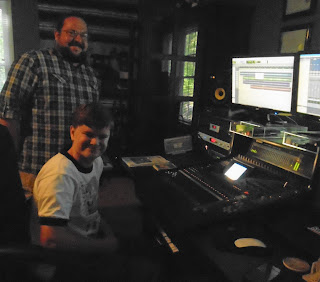Ask our youngest what he wants to be when he grows up, and for the past five years running, you'll have received the same two answers: farmer and roadie. Those two don't really go together, as far as we can tell, but we're all about encouraging him to explore his interests!
Roadie is the generic term for anybody who works on a concert, but it's actually a collective of several jobs, such as Guitar Tech, Lighting Engineer, Sound Engineer, Front of House, Monitors and all those kinds of things. As our youngest is into the sound engineering aspect, that was the focus of our field trip.
We go way back, and have always been all about the music...even on Halloween! It was fun to share this love with my son. That day, they began with the basics -- what is the equipment called and how is it used - and worked their way up through recording several tracks for the same tune and then putting them together. This kid is so not into school, but he was all about hands-on learning...asking lots of questions and further exploring once we headed back to our home base for the evening.
How will this affect his future plans? Well, he still plans to keep his farm business going. His new plan just involves mom and dad taking care of the animals when he's on the road (ha!). We'll cross that bridge when we come to it....
 Dive back into time to discover rock & roll’s roots and see how the music developed along the way. These lessons begin with the various origins, discuss how they intertwined, and proceed through the new millennium. Writing assignments, listening exercises, and videos are included to enhance the learning experience!
Dive back into time to discover rock & roll’s roots and see how the music developed along the way. These lessons begin with the various origins, discuss how they intertwined, and proceed through the new millennium. Writing assignments, listening exercises, and videos are included to enhance the learning experience!- Introduction
- Origins
- Pre-Natal Period
- Birth of Rock & Roll
- The Sixties
- The Seventies
- The Eighties
- The Nineties
- A New Millennium
What are the types of roadies?
"Guitar or Keyboard Techs set the band’s backline up, and the band’s Front of House Engineer and Monitor Engineer will set up all the microphones, make sure everything’s plugged into the consoles, front of house and monitors. It’s a slow process: a couple of hours of setting everything up, plugging it all in, making sure it’s working, line checking it (which is a technical term for making sure that everything is going to where it needs to be).
“At the same time, if there’s a Lighting Engineer, she will be programming the lights so all the lights will be focused on all the elements on stage, depending on how big the stage is. She will be programming the lights to pick up various scenes and various parts of the stage to make it look pretty.
“Once the doors are open the Stage Manager will oversee times, making sure the first opening band goes up on time, the second opening band goes up on time.
“This all takes place in front of the audience but you don’t really notice it because it’s all done on headphones and hand signals. When everybody’s ready to go, the band go on stage.
“So obviously at that point, the Front of House Engineer is working; she’s mixing the sound for the audience. The Monitor Engineer is mixing sound for the band on stage. Guitar Techs will be looking out for the guitars, tuning guitars; the Guitarist may use a different guitar just for one song, so maybe hand him that guitar for that song and so on and so forth.
“When the band finishes, the stage crew will pack down the backline equipment. Everything goes back in the truck or the van or the semi or whatever and it’s on to the next show.”
“At the same time, if there’s a Lighting Engineer, she will be programming the lights so all the lights will be focused on all the elements on stage, depending on how big the stage is. She will be programming the lights to pick up various scenes and various parts of the stage to make it look pretty.
“Once the doors are open the Stage Manager will oversee times, making sure the first opening band goes up on time, the second opening band goes up on time.
“This all takes place in front of the audience but you don’t really notice it because it’s all done on headphones and hand signals. When everybody’s ready to go, the band go on stage.
“So obviously at that point, the Front of House Engineer is working; she’s mixing the sound for the audience. The Monitor Engineer is mixing sound for the band on stage. Guitar Techs will be looking out for the guitars, tuning guitars; the Guitarist may use a different guitar just for one song, so maybe hand him that guitar for that song and so on and so forth.
“When the band finishes, the stage crew will pack down the backline equipment. Everything goes back in the truck or the van or the semi or whatever and it’s on to the next show.”
How does one become a roadie?
“Build up your network. You need to find people who are in bands and just offer to work with them, usually for free, but soon enough, with a good network or through working as a Stagehand at a local club or whatever you will meet people and you’ll go off. I know loads and loads of Road Crew people who have done exactly that.
“Working in a club, just doing a really good job, some band comes through town and go, ‘Hey, you’re really good and our Front of House Engineer just quit’ and you’re off. It really is that simple. It’s a simple process, it’s not easy.”
“But Road Crew are there to make sure things don’t go wrong and if they do go wrong, [to] fix them, and if they can’t figure it out, find out how to fix them. So it’s just like being a Plumber. You don’t call a Plumber because you want to give a Plumber a job, you call a Plumber because you’ve got a plumbing problem. It’s the same with Road Crew.
“You definitely need some type of sound training or appreciation of sound. You can go into being a Lighting Engineer, but admittedly the majority of the work is going to have to do with the actual sound — the front of house or monitor — and/or the backline. The things that make noise. If you understand sound, you’ll be able to communicate with your band as well, more easily.
“So if you’re in college, it’s ideal if you go to lots of gigs and you know lots of local bands; just keep in there and keep saying, ‘I can help you. Let’s work something out where I can help you.’”
“Working in a club, just doing a really good job, some band comes through town and go, ‘Hey, you’re really good and our Front of House Engineer just quit’ and you’re off. It really is that simple. It’s a simple process, it’s not easy.”
What kind of education and experience do you need?
“On-the-job experience in the live music industry is essential for members of the Road Crew. Basically you are a communication and problem solver. You were hired so that things don’t go wrong. Musicians can set up their own equipment; they’re more than capable.“But Road Crew are there to make sure things don’t go wrong and if they do go wrong, [to] fix them, and if they can’t figure it out, find out how to fix them. So it’s just like being a Plumber. You don’t call a Plumber because you want to give a Plumber a job, you call a Plumber because you’ve got a plumbing problem. It’s the same with Road Crew.
“You definitely need some type of sound training or appreciation of sound. You can go into being a Lighting Engineer, but admittedly the majority of the work is going to have to do with the actual sound — the front of house or monitor — and/or the backline. The things that make noise. If you understand sound, you’ll be able to communicate with your band as well, more easily.
“So if you’re in college, it’s ideal if you go to lots of gigs and you know lots of local bands; just keep in there and keep saying, ‘I can help you. Let’s work something out where I can help you.’”
You can also attend a production school such as Berklee College of Music or Full Sail University.










No comments:
Post a Comment
Note: Only a member of this blog may post a comment.